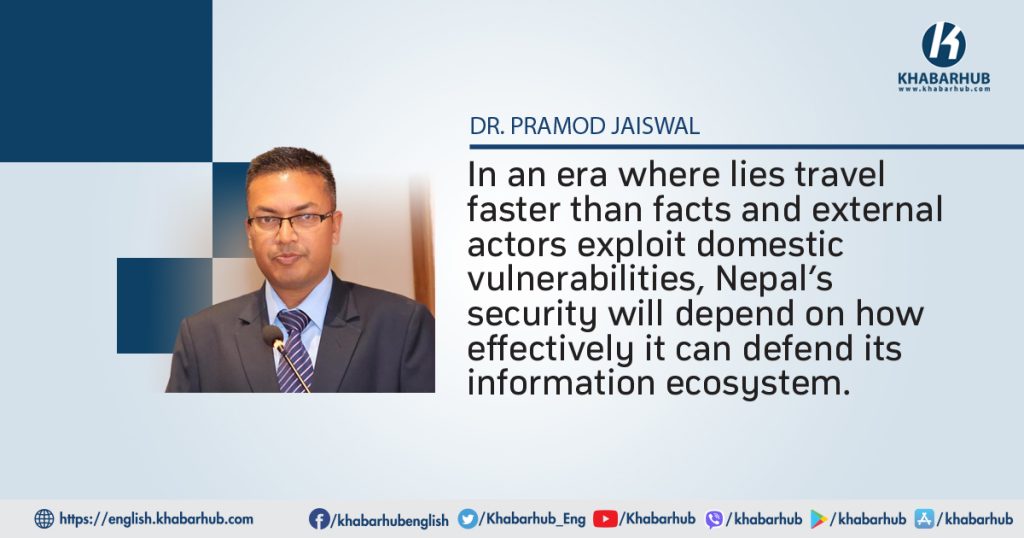Listen to the article
In the twenty-first century, national security has evolved beyond traditional military concerns into the digital realm, where information warfare has become a powerful tool in global power competitions. This shift has created new vulnerabilities for countries worldwide, with developing nations like Nepal facing particular challenges in this emerging threat landscape.
Information weaponization—through misinformation, disinformation, and influence operations—has become a cornerstone of modern hybrid warfare. Unlike conventional military tactics, these digital assaults target public trust and social cohesion, weakening nations from within without firing a single shot.
“These invisible battles are reshaping global security paradigms,” explains Dr. Jaiswal, Research Director at the Nepal Institute for International Cooperation and Engagement (NIICE). “For countries like Nepal, positioned between competing regional powers, the threat is especially acute.”
Nepal’s rapid digital transformation has created significant security gaps. With millions of citizens now relying on platforms like Facebook, TikTok, and YouTube as primary news sources, the country faces a perfect storm of high digital adoption rates coupled with low digital literacy and inadequate regulatory frameworks.
The 2022 general elections highlighted these vulnerabilities when social media platforms were flooded with manipulated videos, misleading political advertisements, and deepfake content. Despite awareness of these challenges, Nepal’s Election Commission lacked both technological capabilities and legal authority to effectively monitor and counter online propaganda.
Foreign actors have recognized and exploited Nepal’s digital vulnerabilities. China has reportedly conducted influence operations across South Asia, promoting pro-Beijing narratives while discrediting critics of its policies on issues like Tibet and Taiwan. During Nepal’s debates over the Belt and Road Initiative and the Millennium Challenge Corporation compact, analysts observed coordinated campaigns across social media platforms, often originating from Nepali-language pages managed outside the country.
Similarly, Russian propaganda networks have begun penetrating South Asian digital ecosystems, positioning Russia as an anti-imperialist force while questioning Western democratic values. These narratives have gained traction in Nepal, blending with domestic populist sentiment and undermining confidence in democratic institutions.
Crisis situations repeatedly expose the fragility of Nepal’s information ecosystem. During the 2015 earthquake, the COVID-19 pandemic, and recent border tensions with India, misinformation spread rapidly, creating public confusion before authorities could issue clarifications.
Nepal’s institutional response remains inadequate for these challenges. The country lacks a dedicated cyber command, suffers from poor coordination among government agencies, and operates without comprehensive cybersecurity legislation. While a National Cyber Security Policy was drafted in 2023, it remains largely aspirational, and the pending Information Technology Bill has yet to address hybrid disinformation threats comprehensively.
The country’s strategic location compounds these issues. Situated between digital powerhouses India and China, Nepal frequently becomes the target of competing influence campaigns. Beijing promotes narratives around stability and development, while New Delhi works to maintain information dominance in Nepali-language media. These competing narratives can polarize Nepali society and complicate foreign policy decisions.
Hybrid threats extend beyond mere propaganda, incorporating cyberattacks, psychological operations, economic pressure, and diplomatic coercion. Nepal’s banking, telecommunications, and government systems have already experienced cyberattacks reportedly originating from foreign servers, highlighting critical security weaknesses.
Election periods present particularly fertile ground for manipulation. During both the 2017 and 2022 elections, researchers identified coordinated inauthentic behavior on social media that mirrored tactics used by foreign actors in other regions—utilizing fake pages, automated accounts, and targeted advertising to influence voters.
“The danger lies in ambiguity,” notes Dr. Jaiswal. “A viral video questioning election credibility can be more damaging than a direct cyberattack on government infrastructure.”
To address these emerging threats, experts recommend Nepal establish a National Centre for Cyber and Information Security that integrates intelligence, defense, and communication agencies. This institution would need both technical capabilities and legal authority to counter disinformation and cross-border cyber intrusions.
Additionally, prioritizing digital literacy programs in schools and civic education would create a more informed citizenry—the first line of defense against information warfare. Media institutions must strengthen editorial oversight and collaborate with fact-checking platforms like Nepali Check and Kathmandu Facts to maintain information integrity.
Regional cooperation will be essential, with opportunities for Nepal to work within frameworks like SAARC and BIMSTEC to share intelligence and build digital defense capabilities. Countries like Estonia and Singapore offer valuable models for building resilient information ecosystems.
As Nepal navigates this complex digital terrain, one thing is clear: in an era where truth itself has become contested territory, protecting information integrity is as vital as defending physical borders. The war for truth is already underway, and Nepal’s sovereignty depends on how effectively it can defend its digital domain.
Fact Checker
Verify the accuracy of this article using The Disinformation Commission analysis and real-time sources.




7 Comments
Disinformation campaigns eroding public trust is a worrying trend. Robust fact-checking, digital literacy, and media regulation will be crucial for countries like Nepal to safeguard their security and social cohesion.
Absolutely. Developing the capabilities to identify and counter foreign influence operations will be a key priority for Nepal and other vulnerable nations.
It’s alarming how quickly digital platforms are becoming prime targets for information warfare. Countering these hybrid threats to national security requires innovative approaches and international cooperation.
Concerning to see how information warfare tactics are being used to undermine security and social cohesion globally. Countries like Nepal face unique challenges navigating this emerging threat landscape as they rapidly digitize.
The weaponization of information through disinformation campaigns is a serious issue that warrants greater attention and concerted multilateral responses. Smaller nations like Nepal are particularly vulnerable to these hybrid threats.
Agreed. Securing digital infrastructure and building public resilience to manipulation will be critical for Nepal and other countries facing these challenges.
The growing threat of information warfare is a complex challenge with far-reaching implications for global security. Addressing this issue requires a comprehensive, multi-stakeholder approach.